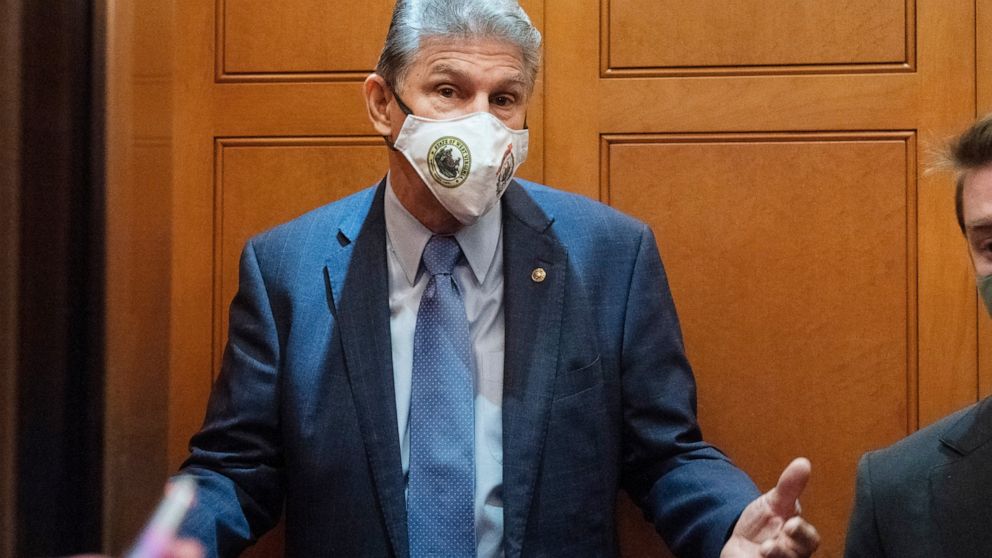New inflation number feeds angst about Democrats’ $2T bill
WASHINGTON — Government reports on rising inflation and on the potential costs of President Joe Biden’s social and environment legislation raised fresh questions Friday about the bill’s fate, with both sides hoping the new numbers would influence pivotal Sen. Joe Manchin.
The moderate Manchin, D-W.Va., has spent months forcing Democrats to trim the 10-year, $2 trillion package, at times citing rising inflation as a reason to slow work on the bill. On Friday, the Labor Department said consumer prices grew last month at an annual rate of 6.8%, the highest in 39 years.
Another concern for Manchin is the overall cost of the legislation. On Friday, a separate report from the nonpartisan Congressional Budget Office said that if many temporary spending boosts and tax cuts in the bill were made permanent, it would add $3 trillion to the price tag, more than doubling the 10-year cost to around $5 trillion. Democrats called the projections from the Republican-requested report fictitious.
Manchin aides did not immediately respond to requests for comment. Just Thursday, Manchin had said in a brief interview that he wanted to know “where we are in inflation and where we are on the true price” of the bill, adding he was “very concerned.”
After months of negotiations, Manchin is still pressing for cuts in a bill that originally had an estimated $3.5 trillion cost. By pointing directly at Manchin’s expressed concerns, Friday’s reports underscored his crucial role as Democrats battle to complete a package delivering many of Biden’s top domestic goals.
Every Democrat in the 50-50 chamber will have to back the bill so Vice President Kamala Harris can cast a tie-breaking vote to approve it.
The political sensitivity of inflation and its impact on the Democratic bill, a collection of family services, health care and climate change priorities, was underscored as leaders of both parties tried to spin the numbers to their advantage.
Democrats argued that the inflation report intensified the need to approve the bill, which reflects many of Biden’s top domestic goals. They said the legislation’s spending and tax credits for health care, children’s costs, education and other programs would help families cope with rising prices. Most of the bill is paid for with tax boosts on the wealthy and big corporations.
“For anyone who, like me, is concerned about costs facing American families, passing BBB is the most immediate and direct step we can take to deliver,” Biden said in a statement, using the acronym for his bill’s formal name, “Build Back Better.”
Republicans argued that the legislation’s expenditures would further feed inflation, which has been driven by supply chain delays making products less available and spending prompted by a strong underlying economy.
Senate Minority Leader Mitch McConnell, R-Ky., said that inflation means “the average American has gotten a pay cut,” adding, “It is unthinkable that Senate Democrats would try to respond to this inflation report by ramming through another massive socialist spending package in a matter of days.”
Democrats limited the duration of many initiatives in their package to help contain the bill’s price tag. That includes extending enhancements to the child tax credit for just one year and free, universal pre-school for only six years.
It’s an accounting move both parties have used to make their budget plans seem more affordable — even though they would like their proposals to be permanent and some may be extended because they are popular. Republicans used such phaseouts robustly for their big tax cuts in 2001 and 2017.
“If you believe these programs go away after one, two or three years, you shouldn’t have a driver’s license,” said Sen. Lindsey Graham of South Carolina, top Republican on the Senate Budget Committee, who requested the CBO estimates. He said the bill’s higher price tag and rising inflation meant Democrats’ legislation would be “lethal to the economy and lethal to your paycheck.”
Democrats said the estimated added $3 trillion cost was bogus because they would propose savings to pay for any future extensions of their initiatives. Senate Majority Leader Chuck Schumer, D-N.Y., said Republicans were using “fake scores based on mistruths,” while House Speaker Nancy Pelosi, D-Calif., called the numbers “a phony score of an imaginary bill.”
Outside groups including the nonpartisan Committee for a Responsible Federal Budget and the University of Pennsylvania’s Wharton School of Business have produced similar estimates about the legislation’s cost if its programs were permanent. CBO numbers usually have more clout in Congress because the agency’s impartiality is respected.
Schumer wants to reach final compromises with Manchin and other Democrats on unresolved issues and push the package through his chamber by Christmas. But much about the legislation remains in play.
Manchin still wants to remove a paid family leave program and curb or eliminate some tax breaks aimed at encouraging a shift to cleaner energy. Moderate Sen. Kyrsten Sinema, D-Ariz., has also pushed to trim the measure.
Democrats have also had differences over how to ease limits on federal tax deductions that people can take on state and local taxes. In addition, the Senate parliamentarian must decide whether some provisions — including a top party priority of letting millions of migrants remain in the U.S. — violate the chamber’s rules and should be removed.
Due to those complications, it is unclear whether Schumer will be able to meet his Christmas deadline. The House approved an initial version of the legislation last month.
![]()


